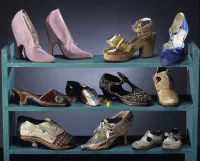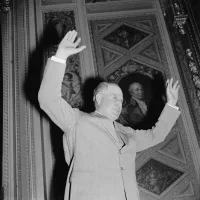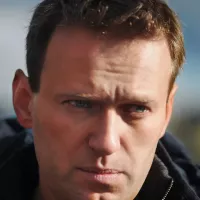Cyprus, officially the Republic of Cyprus, is the third largest island in the Mediterranean Sea. Situated south of Turkey and west of Syria and Lebanon, it is geographically located in West Asia but possesses strong Southeast European cultural influences. The island nation's capital is Nicosia, and while geographically part of West Asia, its culture and geopolitical affiliations align more with Southeast Europe. The northern part of Cyprus is under the self-proclaimed Turkish Republic of Northern Cyprus.
1900: Adamantios Diamantis' Birth
Adamantios Diamantis, considered one of the founding fathers of modern Cypriot art, was born in 1900.
1906: Completion of Famagusta Harbor
The completion of Famagusta Harbor in 1906 significantly enhanced Cyprus's strategic importance for the British. It transformed the island into a key naval outpost in the Eastern Mediterranean, safeguarding crucial shipping routes through the Suez Canal.
November 1914: Formal Annexation and Strategic Importance
Following the Ottoman Empire's entry into World War I against the British, Cyprus was formally annexed by the British in November 1914. The island's strategic location near the Suez Canal made it a valuable asset for the British during the war.
November 1914: Formal Annexation of Cyprus by the British
While Cyprus had been under British administration since 1878, it was in November 1914 that the British Empire formally annexed the island. This annexation was a consequence of the Ottoman Empire's entry into World War I on the side of the Central Powers.
1914: British Annexation of Cyprus
Although under British administration since 1878, the Ottoman Empire remained the de jure ruler of Cyprus. However, with the Ottoman Empire's entry into World War I on the side of the Central Powers, the British Empire formally annexed Cyprus in 1914, ending centuries of Ottoman rule.
1923: Treaty of Lausanne and Turkish Relinquishment of Cyprus
Under the Treaty of Lausanne, signed in 1923, Turkey formally relinquished any claim to Cyprus, solidifying British control over the island. This treaty marked a significant moment in the history of Cyprus and its relationship with Turkey.
1924: Christophoros Savva's Birth
Christophoros Savva, another key figure in modern Cypriot art, was born in 1924.
1925: Cyprus Becomes a British Crown Colony
In 1925, Cyprus officially became a British crown colony. This status formalized British rule and set the stage for decades of colonial administration on the island.
1931: Glyn Hughes' Birth
Glyn Hughes, an English Cypriot artist, was born in 1931.
1946: Cyprus Population Demographics
By 1946, the census revealed that Greeks made up 80.2% of Cyprus's population, while Turkish Cypriots constituted a smaller portion. These demographics underscored the political complexities and ethnic divisions on the island.
January 1950: Referendum on Enosis
In January 1950, the Church of Cyprus organized a referendum on enosis (union with Greece), with the overwhelming majority of participating Greek Cypriots voting in favor. However, this referendum was boycotted by Turkish Cypriots and did not lead to immediate change.
1952: Lawrence Durrell's Time in Cyprus
In 1952, British author Lawrence Durrell moved to Cyprus and worked for the British colonial government.
1955: Formation of EOKA and TMT
The year 1955 witnessed the formation of two significant organizations: EOKA, a Greek Cypriot nationalist group advocating for enosis through armed struggle, and TMT, a Turkish Cypriot paramilitary organization supporting partition. The emergence of these groups marked a significant escalation in intercommunal tensions and set the stage for future violence.
1956: Durrell Leaves Cyprus
Lawrence Durrell left Cyprus in 1956 after living and working there for four years.
1957: "Bitter Lemons" Wins Duff Cooper Prize
Lawrence Durrell's book "Bitter Lemons", about his experiences in Cyprus, was awarded the Duff Cooper Prize in 1957.
July 1958: British Policy Towards Turkish Resistance Organization
In July 1958, internal British documents revealed a policy of tolerating the activities of the Turkish Resistance Organisation (TMT), a paramilitary group advocating for partition, despite its illegal actions. This approach aimed to maintain good relations with Turkey but fueled tensions on the island.
1958: Vassilis Vryonides' Career
Vassilis Vryonides, a painter who studied at the Academy of Fine Arts in Venice, passed away in 1958, marking the beginning of modern Cypriot art history.
August 1960: Cyprus Gains Independence
On August 16, 1960, Cyprus officially gained its independence. The newly formed republic had a population consisting of 77.1% Greek Cypriots, 18.2% Turkish Cypriots, and 4.7% others. The constitution aimed to balance power but faced challenges in practice.
December 1960: First Population Census After Independence
In December 1960, the first population census after Cyprus's independence was conducted, encompassing the entire island. The census revealed a total population of 573,566, comprising 77.1% Greeks, 18.2% Turks, and 4.7% others.
1960: Cyprus Gains Independence
After years of struggle and negotiation, Cyprus gained independence in 1960. This significant event marked the end of British colonial rule and set the stage for the complex political landscape that would follow.
1960: Founding of Apophasis [Decision]
Christophoros Savva, along with Welsh artist Glyn Hughes, established Apophasis [Decision] in 1960, marking the inception of the first independent cultural center in the newly formed Republic of Cyprus.
1960: Independence and Intercommunal Tensions
Despite gaining independence in 1960, tensions between the Greek Cypriot majority (77%) and Turkish Cypriot minority (18%) remained high. The struggle for power and influence between the two communities set the stage for future conflicts.
1960: Greek and Turkish Become Official Languages
Greek and Turkish were designated as official languages of Cyprus in 1960, while Armenian and Cypriot Maronite Arabic received recognition as minority languages.
1960: Independence and Demographic Context
In 1960, Cyprus gained independence with a population comprised of 77% Greek Cypriots and 18% Turkish Cypriots. This demographic context played a significant role in the ensuing political tensions and conflicts on the island.
1960: Constitutional Crisis and Makarios' Call for Changes
Shortly after independence in 1960, Cyprus faced a constitutional crisis. Cypriot President Archbishop Makarios III proposed constitutional amendments, which were met with resistance from Turkish Cypriots and Turkey, escalating intercommunal tensions.
1960: Treaty of Guarantee Signed
The 1960 Treaty of Guarantee was signed, which would later be cited by Turkey as justification for its intervention in Cyprus.
1960: Establishment of the Republic of Cyprus
The Republic of Cyprus was established in 1960 with a constitution that aimed to protect the interests of both Greek Cypriots and Turkish Cypriots through a power-sharing agreement.
1961: Cyprus Joins the Commonwealth
Cyprus became a member of the Commonwealth of Nations in 1961, shortly after gaining independence. This membership reflects historical ties with the United Kingdom and a commitment to shared values of democracy and good governance.
December 1963: Intercommunal Violence Erupts in Cyprus
In December 1963, intercommunal violence erupted in Cyprus, resulting in the deaths of hundreds of Greek and Turkish Cypriots. The violence led to the displacement of thousands of Turkish Cypriots and the end of their involvement in the government.
1963: Inter-Communal Ethnic Tensions Rise
From 1963 to 1974, inter-communal ethnic tensions escalated, making an island-wide census impractical.
1963: Intercommunal Violence in Cyprus Leads to Displacement and Political Divide
The crisis of 1963 in Cyprus resulted in significant intercommunal violence, leading to the displacement of over 25,000 Turkish Cypriots and ending their representation in the republic.
1963: Intercommunal Violence Contributes to Missing Persons
The intercommunal violence that began in 1963 contributed to the number of missing persons in the years leading up to and including 1974.
1963: Intercommunal Violence and Displacement
The year 1963 witnessed a surge in intercommunal violence between Greek Cypriots and Turkish Cypriots. This violence led to the displacement of a significant portion of the Turkish Cypriot population into enclaves, further escalating the division on the island.
1964: Turkish Cypriot seats in the House of Representatives remain vacant
The Turkish Cypriot seats in the House of Representatives continued to remain vacant since 1964, highlighting the ongoing political divide within Cyprus.
1965: Turkish Cypriot seats in the House of Representatives vacated
Following clashes between Greek Cypriots and Turkish Cypriots, the Turkish Cypriot seats in the House of Representatives were left vacant in 1965. This event marked a significant escalation in tensions between the two communities.
1968: Christophoros Savva's Passing and Cyprus' Inaugural Pavilion at the Venice Biennale
Christophoros Savva, who studied in London, co-founded Apophasis [Decision], the first independent cultural center in the newly established Republic of Cyprus, in 1960. In 1968, he was among the artists representing Cyprus in its inaugural pavilion at the 34th Venice Biennale. Tragically, Savva passed away in the same year.
1973: Cypriot Government Conducts Census
In 1973, the Cypriot government conducted a census excluding the Turkish Cypriot population, reporting a Greek Cypriot population of 482,000.
July 1974: Coup and Turkish Invasion
In July 1974, a coup orchestrated by Greek Cypriot nationalists aiming for union with Greece (enosis) triggered a Turkish invasion. This event led to the capture of Northern Cyprus and the displacement of thousands of Greek and Turkish Cypriots.
December 1974: Makarios Returns to Cyprus; Turkish Troops Remain
Archbishop Makarios III returned to Cyprus in December 1974 after the coup, but Turkish troops remained on the island, occupying the northeastern portion.
1974: Division of Cyprus
Cyprus was divided in 1974 when the Turkish army occupied the northern third of the island. This followed a coup attempt backed by the Greek military junta.
1974: Turkish Occupation and Displacement in Cyprus
Following the Turkish invasion of 1974, Turkey occupied a significant portion of Cyprus, leading to the displacement of both Greek and Turkish Cypriots. Thousands remained missing in the aftermath.
1974: Military Occupation and Population Estimates
Following the military occupation of a part of Cyprus in 1974, the government's Department of Statistics and Research estimated the island's total population at 641,000, with 78.9% Greeks and 18.4% Turks.
1974: Turkish Settlement and Political Divide Persist in Cyprus
The events of 1974 continued to have a significant impact on Cyprus, with Turkish settlers encouraged to move to the north, leading to ongoing political division and disputes over land and rights.
1975: Sotiris Kaiafas Wins European Golden Shoe
Cypriot footballer Sotiris Kaiafas made history in the 1975-76 season by winning the European Golden Shoe, making Cyprus the smallest country by population to have a player receive this award.
1975: US Imposes Arms Embargo on Turkey
In 1975, following Turkey's invasion of Cyprus, the US Congress imposed an arms embargo on Turkey for using US-supplied equipment during the invasion.
1976: Census Conducted Excluding Turkish-Controlled Areas
A census was conducted in 1976, excluding Turkish-controlled areas.
1982: Census Conducted Excluding Turkish-Controlled Areas
A census was conducted in 1982, excluding Turkish-controlled areas.
1983: Turkish Republic of Northern Cyprus Declared
In 1983, the Turkish Cypriot parliament declared the Turkish Republic of Northern Cyprus (TRNC), which was only recognized by Turkey.
1983: Declaration of the Turkish Republic of Northern Cyprus
In 1983, the Turkish Republic of Northern Cyprus (TRNC) declared its independence. This unilateral declaration was met with widespread international condemnation and is only recognized by Turkey. The event solidified the division of the island.
1985: TRNC adopts a constitution and holds elections
The TRNC adopted its constitution and held its first elections in 1985. This further solidified the division of the island.
1989: English Used in Courts of Law
English continued to be used de facto in courts of law until 1989.
1992: Census Conducted Excluding Turkish-Controlled Areas
A census was conducted in 1992, excluding Turkish-controlled areas.
1993: Cyprus Police placed under the Ministry of Justice and Public Order
In 1993, the Cyprus Police, the national police service of the Republic of Cyprus, was placed under the authority of the Ministry of Justice and Public Order.
1994: Adamantios Diamantis' Passing
Adamantios Diamantis passed away in 1994.
1994: Establishment of the Cinema Advisory Committee
The year 1994 marked a significant development for Cypriot film production with the establishment of the Cinema Advisory Committee.
1996: "I Sphagi tou Kokora" Receives Eurimages Funding
The first Cypriot film to receive funding from the Council of Europe's Eurimages Fund was "I Sphagi tou Kokora" in 1996.
1996: English Used in Legislation
The use of English persisted in legislation until 1996.
1999: "To Tama" Receives Eurimages Funding
The Cypriot film "To Tama" was granted funding from the Eurimages Fund in 1999.
2000: Increased Government Funding for Filmmaking and "O Dromos gia tin Ithaki" Receives Eurimages Funding
In 2000, the Cypriot government allocated CYP£500,000 (approximately €850,000) from the national budget to support filmmaking. Additionally, the film "O Dromos gia tin Ithaki" secured funding from the Eurimages Fund.
2001: Census Conducted Excluding Turkish-Controlled Areas
A census was conducted in 2001, excluding Turkish-controlled areas.
2001: Religious Composition According to Census
According to the 2001 census in government-controlled areas, 94.8% of the population identified as Eastern Orthodox, 0.9% as Armenian and Maronite, 1.5% as Roman Catholic, 1.0% as Church of England, 0.6% as Muslim, and 1.3% as other denominations or unspecified.
2001: Heavy Rainfall Increases Cyprus' Water Reserves
Exceptionally heavy rainfall from 2001 to 2004 significantly boosted Cyprus' water reserves, pushing supply above demand.
2001: CIA World Factbook Estimates Population Composition
In 2001, the CIA World Factbook estimated that Greek Cypriots constituted 77% of the total Cypriot population, Turkish Cypriots 18%, and other groups 5%.
2001: Cyprus Invests in Desalination to Address Water Shortage
Recognizing the growing water scarcity issue, the Cypriot government made significant investments in desalination plants since 2001, providing a substantial portion of domestic water.
April 2003: Northern Cyprus Eases Checkpoint Restrictions
In April 2003, Northern Cyprus unilaterally eased restrictions at checkpoints, allowing Cypriots to cross between the two sides for the first time in 30 years.
2003: Cyprus Demarcates Maritime Border with Egypt
Cyprus established its maritime border with Egypt in 2003.
May 2004: Cyprus Joins the European Union
Cyprus joined the European Union in May 2004 as a whole, though EU legislation was suspended in Northern Cyprus pending a settlement.
2004: Cyprus joins the European Union
Cyprus became a member of the European Union in 2004, joining nine other countries.
2004: Heavy Rainfall Increases Cyprus' Water Reserves
Exceptionally heavy rainfall from 2001 to 2004 significantly boosted Cyprus' water reserves, pushing supply above demand.
2004: Annan Plan for Cyprus Reunification Rejected
In 2004, the Annan Plan, aimed at reunifying Cyprus, was rejected in separate referendums by Greek and Turkish Cypriots.
2005: Cyprus Water Reserves Reach All-Time High
By the beginning of 2005, Cyprus' water reserves reached an all-time high thanks to several years of heavy rainfall.
2006: Marcos Baghdatis Achieves Career High Ranking
In 2006, Cypriot tennis player Marcos Baghdatis achieved a career-high ranking of 8th in the world. He also reached the final of the Australian Open and the semifinals of Wimbledon that year.
2006: Census in Northern Cyprus
In 2006, a census in Northern Cyprus reported a de jure population of 256,644.
2006: French and German Language Use
In 2006, data revealed that 12% of the population spoke French, and 5% spoke German.
2006: Plans Announced to Improve Public Transport
In 2006, plans were revealed to enhance and expand bus and public transport services across Cyprus, supported by funding from the European Union Development Bank.
2006: European Heat Wave Impacts Cyprus Water Supply
The 2006 European heat wave contributed to a decrease in Cyprus' water supply, as demand continued to increase.
2006: Cyprus Rugby Federation Founded
The Cyprus Rugby Federation was established in 2006.
2007: Political Landscape of Cyprus
As of 2007, Cyprus' political environment was dominated by parties such as AKEL, Democratic Rally, Democratic Party, and EDEK, with 24 seats in the House of Representatives remaining vacant since 1964.
2007: Kyriakos Ioannou Wins Bronze at World Championships
Cypriot high jumper Kyriakos Ioannou earned a bronze medal at the 11th IAAF World Championships in Athletics in Osaka, Japan, in 2007 with a jump of 2.35 meters.
2007: Cyprus Demarcates Maritime Border with Lebanon
Cyprus demarcated its maritime border with Lebanon in 2007.
January 2008: Cyprus adopts the Euro
Cyprus replaced the Cypriot pound with the Euro on January 1st, 2008.
March 2008: Wall on Ledra Street Demolished
March 2008 saw the demolition of a wall that had divided Ledra Street in Nicosia for decades, symbolizing progress towards reunification.
April 2008: Ledra Street Reopened
In April 2008, Ledra Street, a key crossing point in Nicosia, was reopened in the presence of officials from both sides.
2008: Dimitris Christofias becomes President
Dimitris Christofias made history in 2008 by becoming the first Communist head of state in Cyprus.
2008: Anorthosis Famagusta FC Makes History
During the 2008-2009 season, Anorthosis Famagusta FC became the first Cypriot team to qualify for the UEFA Champions League Group stage.
2010: Cyprus Demarcates Maritime Border with Israel
Cyprus established its maritime border with Israel in 2010.
2010: English Proficiency in Cyprus
In 2010, it was reported that 80.4% of Cypriots were proficient in English as a second language.
2010: International Crisis Group Estimates Total Population
In 2010, the International Crisis Group estimated a total population of 1.1 million for the entire island of Cyprus. This estimate included approximately 300,000 residents in the north, with potentially half being Turkish-born or descendants of Turkish settlers.
2010: Cyprus at the 2010 Winter Olympics
Siblings Christopher and Sophia Papamichalopoulou represented Cyprus at the 2010 Winter Olympics in Vancouver, Canada, marking the first time Cypriot athletes qualified for the Winter Games.
2010: New Bus Network Implemented
The year 2010 saw the implementation of a new bus network in Cyprus.
January 2011: Freedom House rates Cyprus as "free"
In January 2011, Freedom House, a U.S.-based NGO, designated Cyprus as "free" in its annual report 'Freedom in the World 2011'.
August 2011: Noble Energy Signs Production-Sharing Agreement
In August 2011, Noble Energy, a US-based firm, signed a production-sharing agreement with the Cypriot government for the commercial development of the Aphrodite gas field in Cyprus's exclusive economic zone.
September 2011: Cyprus Begins Drilling at Block 12
On September 19, 2011, Cyprus commenced drilling operations at Block 12, an area within its exclusive economic zone, despite threats from Turkey. Notably, the drilling proceeded without any reported incidents.
2011: Census Conducted Excluding Turkish-Controlled Areas
A census was conducted in 2011, excluding Turkish-controlled areas.
2011: Russian Population in Cyprus
As of 2011, there were 10,520 individuals of Russian origin residing in Cyprus.
2011: APOEL FC Reaches UEFA Champions League Quarterfinals
In the 2011-2012 season, APOEL FC made history by becoming the first Cypriot team to reach the quarterfinals of the UEFA Champions League. They achieved this feat by winning their group and defeating French club Olympique Lyonnais in the Round of 16.
2011: Costas Philippou Begins UFC Career
Mixed martial artist Costas Philippou, who is Cypriot, began his UFC career in 2011, competing in the middleweight division.
June 2012: Cyprus seeks foreign aid amidst financial crisis
In June 2012, amidst a global financial crisis and the Eurozone crisis, Cyprus announced it needed €1.8 billion in foreign aid to support the Cyprus Popular Bank.
2012: Cypriot Financial Crisis
Cyprus experienced a financial crisis from 2012 to 2013, significantly impacting its economy and leading to an agreement with the Eurogroup for a bailout.
2012: Cyprus Wins First Olympic Medal
Pavlos Kontides made history for Cyprus in 2012 by winning a silver medal in the Men's Laser class sailing competition at the Summer Olympics, securing the country's first-ever Olympic medal.
2012: Beginning of the Cypriot Financial Crisis
The Cypriot Financial Crisis, lasting from 2012 to 2013, had a profound impact on the country's economy and led to a bailout agreement with the Eurogroup.
February 2013: Nicos Anastasiades Elected President
Nicos Anastasiades was sworn in as President of Cyprus on February 28, 2013, after winning the presidential election with 57.48% of the vote.
March 2013: Eurogroup bailout agreement and haircut on uninsured deposits
In March 2013, the Eurogroup agreed to bail out Cyprus, but the deal included a haircut on uninsured deposits, many belonging to wealthy Russians using Cyprus as a tax haven.
2013: Turkey Begins Offshore Drilling
In 2013, Turkish offshore drilling companies began accessing natural gas and oil resources in the area, despite Cyprus's claims.
2014: Glyn Hughes' Passing
Glyn Hughes passed away in 2014.
2014: European Court of Human Rights orders Turkey to pay compensation to Cyprus
In 2014, the European Court of Human Rights ruled that Turkey must compensate Cyprus for the 1974 invasion. However, Turkey refused to comply with the ruling.
2015: Costas Philippou Retires from UFC
In 2015, Costas Philippou retired from UFC competition after a career that included a 6-4 record in the organization.
2015: Cyprus Ranked "Free" in Freedom of the Press Report
In 2015, Freedom House's Freedom of the Press report classified both the Republic of Cyprus and Northern Cyprus as "free" in terms of press freedom.
2015: Reunification Talks Relaunched
Reunification talks between the two sides of Cyprus were relaunched in 2015, aiming to find a lasting solution to the division.
2016: Shift Towards Professional Enlisted Institution
The Cyprus National Guard saw a shift towards a larger professional enlisted institution (ΣΥΟΠ) in 2016, coinciding with the reduction in conscript service.
2016: Reduction of Compulsory Military Service
The period of compulsory service in the Cypriot National Guard was reduced from 24 months to 14 months in 2016.
2017: Cyprus Reunification Talks Collapse
Despite efforts to reach a solution, reunification talks between Greek and Turkish Cypriots collapsed in 2017.
2018: Cyprus Forest Landscape Integrity Index
In 2018, the Forest Landscape Integrity Index ranked Cyprus 59th globally for its forest conservation efforts.
2018: Nicos Anastasiades Re-elected
Nicos Anastasiades was re-elected for a second term as President of Cyprus in 2018, securing 56% of the vote.
2018: European Heat Wave Impacts Cyprus Water Supply
The 2018 European heat wave further strained Cyprus' water supply, adding to the challenges of drought and increasing demand.
February 2019: EU Warns Cyprus Over Passport Sales
The European Union issued a warning to Cyprus in February 2019 about selling passports to Russian oligarchs, raising concerns about organized crime.
July 2019: Cyprus Changes Citizenship Law
In July 2019, Cyprus changed its citizenship law following concerns over the sale of passports to foreign nationals.
2019: European Heat Waves Impact Cyprus Water Supply
The European heat waves of 2019 exacerbated Cyprus' water scarcity issues as droughts became more frequent.
2020: Leaked Documents Reveal Extent of Cyprus Passport Sales, and Maritime Dispute Arises
Leaked documents in 2020 revealed the extent of Cyprus' passport sales to foreign individuals. Additionally, a dispute arose between Cyprus and Turkey over their exclusive economic zones, particularly regarding oil and gas exploration.
June 2021: English Cypriot Artist Glyn Hughes Passes Away
English Cypriot Artist Glyn Hughes passed away in June 2021.
2021: Census Conducted Excluding Turkish-Controlled Areas
A census was conducted in 2021, excluding Turkish-controlled areas.
2021: Sikh Population Estimated
In 2021, the Sikh population in Cyprus was estimated to be 13,280, representing 1.1% of the total population. This makes Cyprus home to the third-largest national proportion of Sikhs globally.
2021: Population Census Conducted
The Republic of Cyprus conducted a population census in 2021, revealing a population of 918,100 in government-controlled areas, with Nicosia and Limassol being the most populous districts.
2022: European Heat Waves Impact Cyprus Water Supply
Cyprus' water supply faced ongoing challenges in 2022, with the European heat waves contributing to drought conditions.
February 2023: Nikos Christodoulides Elected President
Nikos Christodoulides was sworn in as the eighth president of the Republic of Cyprus on February 28, 2023, after winning the presidential election.
November 2023: Cyprus Confidential Data Leak Exposes Financial Ties to Russia
In November 2023, the Cyprus Confidential data leak revealed strong financial links between Cyprus and Russian oligarchs and figures close to the Kremlin, raising concerns about support for the Putin regime.
2023: Cyprus' economic recovery and high GDP per capita
By 2023, Cyprus had made a significant economic recovery. The International Monetary Fund estimated its GDP per capita at $54,611, positioning it as the highest in Southern Europe, although slightly below the European Union average.
Mentioned in this timeline

A shoe is a protective and comfort-providing item of footwear...
Japan is an East Asian island country located in the...
Russia officially the Russian Federation spans Eastern Europe and North...
Lebanon is a country in the Levant region of West...
Canada is a North American country the second largest in...

Books are a means of storing information as text or...
Trending

41 minutes ago Victoria Mboko surges into WTA 1000 final after defeating Ostapenko in Doha.

42 minutes ago House Passes SAVE America Act: Senate Battle Looms Over Voting Rights

2 hours ago De Minaur Advances in Rotterdam; ABN AMRO Tournament Prediction; News Announcement Disappoints Fans

2 hours ago Julia Simon wins Gold; German Biathletes Preuss & Voigt Miss Podium at Olympia.
2 hours ago Son's American Idol Audition Makes Country Star Cry; Franklin Resident Joins

3 hours ago Navalny Killed by Russia Using Dart Frog Toxin, UK and Europe Claim.
Popular

Kid Rock born Robert James Ritchie is an American musician...
The Winter Olympic Games a major international multi-sport event held...

Pam Bondi is an American attorney lobbyist and politician currently...

Barack Obama the th U S President - was the...

XXXTentacion born Jahseh Dwayne Ricardo Onfroy was a controversial yet...
Randall Adam Fine is an American politician a Republican who...